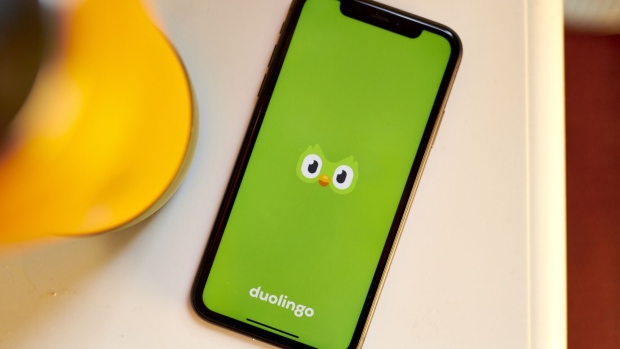Jan 8, 2024
Duolingo Cuts 10% of Contractors as It Uses More AI to Create App Content
, Bloomberg News

(Bloomberg) -- Duolingo Inc., the maker of language-learning software, is cutting some contractors while using generative artificial intelligence to create more content, the latest sign that companies are shifting some tasks typically handled by workers to AI tools.
About 10% of contractors were “offboarded,” a company spokesperson said Monday. “We just no longer need as many people to do the type of work some of these contractors were doing. Part of that could be attributed to AI,” the spokesperson said.
Chief Executive Officer Luis von Ahn said in a November letter to shareholders that the company is using generative AI — a technology that lets users more quickly create text, speech and images — to produce “new content dramatically faster,” such as the scripts to shows that help teach languages. The company also uses AI to generate voices within the app and has introduced a premium tier, Duolingo Max, with AI-generated feedback and conversations in other languages.
The shares rose 3.2% to $210.65 at 2:16 p.m. in New York after more than tripling in 2023.
The spokesperson said the job reduction isn’t a “straight replacement” of workers with AI, as many of its full-time employees and contractors use the technology in their work. Duolingo had 600 full-time workers at the end of 2022, according to company filings. The spokesperson added that no full-time employees were affected by the cutback.
The intense interest in generative AI has led employee groups and unions to question whether businesses will use the technology as an excuse to reduce their workforce. A report published in April by the World Economic Forum estimated that AI would cause “significant labor-market disruption” over the next five years, though the net impact may be positive as employers seek workers with more technical skills to navigate the use of the technology.
Last month, Microsoft Corp. responded to those concerns and announced an alliance with the American Federation of Labor and Congress of Industrial Organizations, which is made up of 60 unions that represent 12.5 million workers, to train people about AI and look at how the technology may affect employment.
At an event announcing the partnership, Microsoft President Brad Smith said the goal is to bring industry and labor to the table to “enhance” the way people work.
“I can’t sit here and say that AI will never displace a job,” Smith said the event. “I don’t think that would be honest. AI is well-designed to accelerate and eliminate some of the parts of people’s jobs that you might consider to be drudgery.”
Chegg Inc., which offers online homework-help services, said in June that it will cut 4% of its workforce and better incorporate AI into its tutoring as students become more comfortable with chatbots.
In May, International Business Machines Corp. Chief Executive Officer Arvind Krishna said the company expected to pause hiring for roles it thinks can be replaced by AI technology in the next few years. He said 30% of the jobs in back-office functions, such as human resources, could be automated with AI tools over a five-year period.
--With assistance from Jackie Davalos and Josh Eidelson.
(Updates with CEO letter in the third paragraph.)
©2024 Bloomberg L.P.





